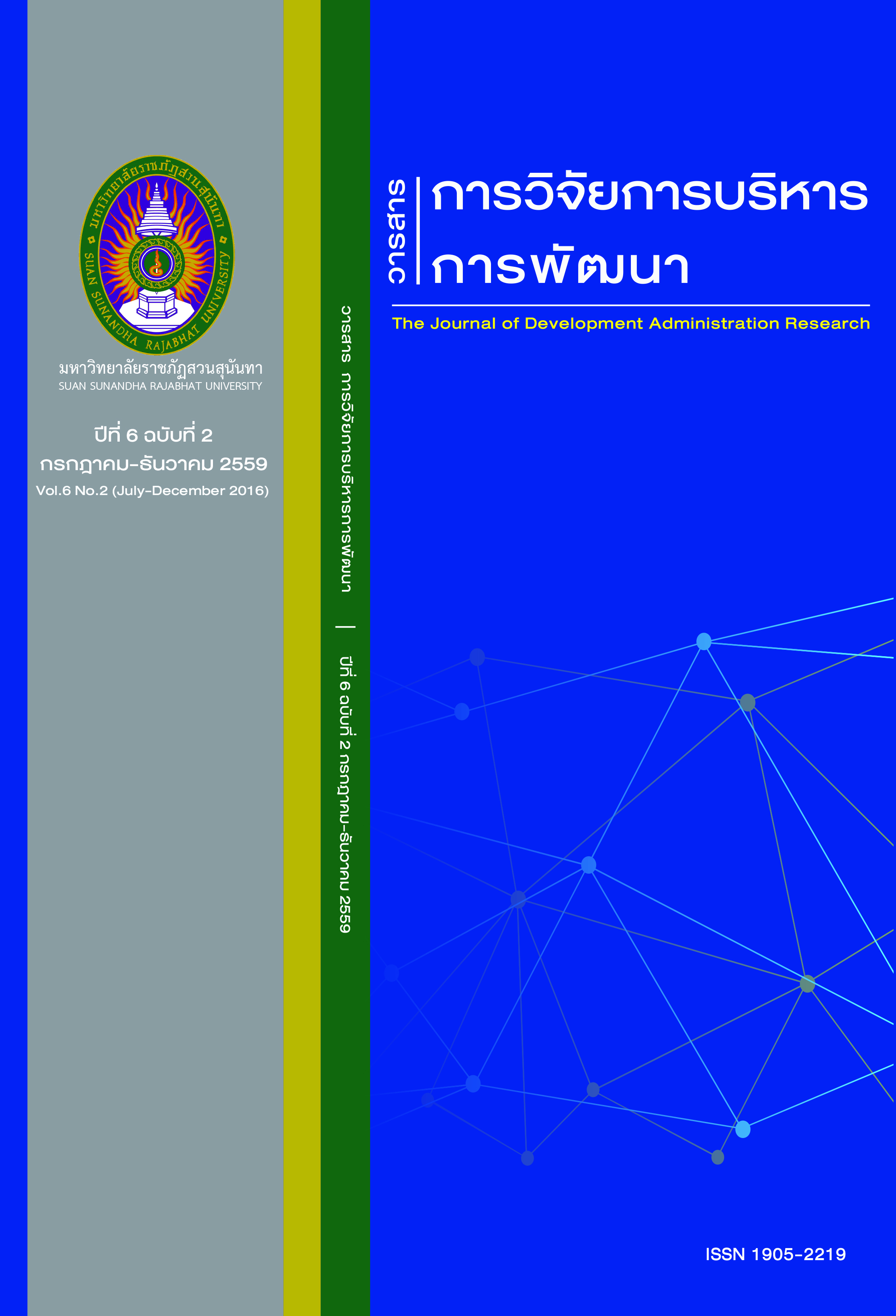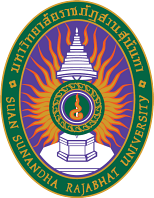การเปรียบเทียบผลสัมฤทธิ์ทางการเรียนและเจตคติต่อการเรียน วิชาคณิตศาสตร์ของนักเรียนชั้นประถมศึกษาปีที่ 5 ที่ได้รับการสอนโดยวิธีสอนแบบค้นพบโดยใช้เกมกับการสอนตามคู่มือครู
คำสำคัญ:
ผลสัมฤทธิ์ทางการเรียน, เจตคติต่อการเรียน, วิธีสอนแบบค้นพบบทคัดย่อ
การวิจัยครั้งนี้มีจุดประสงค์ เพื่อศึกษาเปรียบเทียบผลสัมฤทธิ์ทางการเรียนและเจตคติต่อการเรียนวิชาคณิตศาสตร์ของนักเรียนชั้นประถมศึกษาปีที่ 5 ที่ได้รับการสอนโดยวิธีสอนแบบค้นพบโดยใช้เกมกับการสอนตามคู่มือครู กลุ่มตัวอย่างที่ใช้ในการวิจัยได้แก่ นักเรียนชั้นประถมศึกษาปีที่ 5 โรงเรียนสาธิตบางนา จังหวัดสมุทรปราการ ภาคเรียนที่ 2 ปีการศึกษา 2549 จำนวน 4 ห้อง โดยการสุ่มตัวอย่างง่าย (simple random sampling) แบ่งเป็นกลุ่มทดลองที่ได้รับการสอนโดยใช้เกมประกอบการสอน 2 ห้อง จำนวน 50 คน และกลุ่มควบคุมที่ได้รับการสอนตามคู่มือครู 2 ห้อง จำนวน 50 คน เครื่องมือที่ใช้ในการวิจัยเป็นแบบสอบถาม วิเคราะห์ข้อมูลหาค่าร้อยละ ค่าเฉลี่ย ส่วนเบี่ยงเบนมาตรฐาน เปรียบเทียบเจตคติต่อวิชาคณิตศาสตร์ ระหว่างกลุ่มทดลองกับกลุ่มควบคุมโดยใช้ ANCOVA และเปรียบเทียบผลสัมฤทธิ์ทางการเรียนวิชาคณิตศาสตร์ระหว่างกลุ่มทดลองกับกลุ่มควบคุมโดยการวิเคราะห์ความแปรปรวนร่วม (ANCOVA) ผลการวิจัยพบว่า (1) นักเรียนชั้นประถมศึกษาปีที่ 5 โรงเรียนสาธิตบางนา จังหวัดสมุทรปราการ ที่ได้รับการสอนโดยใช้เกมประกอบการสอน มีเจตคติต่อการเรียนวิชาคณิตศาสตร์โดยภาพรวมอยู่ในระดับดี เมื่อพิจารณาเป็นรายข้อพบว่า นักเรียนมีเจตคติต่อการเรียนวิชาคณิตศาสตร์อยู่ในระดับดีมาก 3 ข้อ ระดับดี 13 ข้อ เฉย ๆ 13 ข้อ และระดับไม่ดี 1 ข้อ โดย 5 อันดับแรก ได้แก่ คณิตศาสตร์เป็นวิชาที่มีประโยชน์มาก คณิตศาสตร์เป็นวิชาที่มีความสำคัญ คณิตศาสตร์เป็นวิชาที่ฝึกให้คนฉลาด และมีไหวพริบ ข้าพเจ้าอยากเป็นคนเก่งคณิตศาสตร์ และเนื้อหาวิชาคณิตศาสตร์ทำให้ข้าพเจ้าเบื่อโรงเรียน (2) นักเรียนที่ได้รับการสอนโดยวิธีสอนแบบค้นพบโดยใช้เกม กับนักเรียนที่ได้รับการสอนตามคู่มือครู มีเจตคติต่อวิชาคณิตศาสตร์แตกต่างกันอย่างไม่มีนัยสำคัญทางสถิติที่ระดับ .05 (3) นักเรียนที่ได้รับการสอนโดยวิธีสอนแบบค้นพบโดยใช้เกม กับนักเรียนที่ได้รับการสอนตามคู่มือครู มีผลสัมฤทธิ์ต่อวิชาคณิตศาสตร์แตกต่างกันอย่างมีนัยสำคัญทางสถิติที่ระดับ .05
เอกสารอ้างอิง
ชัยศักดิ์ ลีลาจรัสกุล. (2543). การเปรียบเทียบผลสัมฤทธิ์ทางการเรียน ความสนใจ และความคงทนในการเรียนรู้ของนักเรียนชั้นมัธยมศึกษาปีที่ 2 ที่ผลสัมฤทธิ์ทาง การเรียนวิชาคณิตศาสตร์ต่ำโดยการสอนตามหลักการเพื่อรู้แจ้งกับการสอนตามคู่มือ ครู สสวท. วิทยานิพนธ์ศึกษาศาสตรมหาบัณฑิต, มหาวิทยาลัยศรีนครินทรวิโรฒ.
ประภาเพ็ญ สุวรรณ. (2520). ทัศนคติ: การวัดการเปลี่ยนแปลงและพฤติกรรมอนามัย. กรุงเทพมหานคร: สำนักพิมพ์ไทยวัฒนาพาณิช.
พรรณี ชูทัย. (2522). จิตวิทยาการเรียนการสอน. กรุงเทพมหานคร: โรงพิมพ์วรวุฒิการพิมพ์.
ยุพิน พิพิธกุล และอรพรรณ ต้นบรรจง. (2531). เทคโนโลยีการผลิตสื่อการสอนคณิตศาสตร์ (พิมพ์ครั้งที่ 3). กรุงเทพมหานคร: โรงพิมพ์สำนักงานส่งเสริมและฝึกอบรม.
สกุณา บุญสูง. (2540). เจตคติที่มีต่อการเรียนการสอนภาษาอังกฤษของนักเรียนชั้นประถมศึกษาปีที่ 5-6 ที่พูดภาษาไทยเป็นภาษาที่สอง. วิทยานิพนธ์ศึกษาศาสตร-มหาบัณฑิต, มหาวิทยาลัยเชียงใหม่.
สำเริง งามขำ. (2546). การเปรียบเทียบผลสัมฤทธิ์ทางการเรียนวิชาคณิตศาสตร์ของนักเรียนชั้นมัธยมศึกษาปีที่ 1 โดยใช้เกมประกอบการสอนกับการสอนตามคู่มือครู. วิทยานิพนธ์ศึกษาศาสตรมหาบัณฑิต, มหาวิทยาลัยศรีนครินทรวิโรฒ.
สุพรรณี สุขะสันติ์. (2545). ศูนย์พัฒนาหนังสือกรมวิชาการกระทรวงศึกษาธิการ. กรุงเทพมหานคร:
อัญชลี บุญถนอม. (2542). การเปรียบเทียบผลสัมฤทธิ์ทางการเรียนเจตคติต่อวิชาคณิตศาสตร์ และความคงทนในการเรียนรู้วิชาคณิตศาสตร์ของนักเรียนชั้นมัธยมศึกษาปีที่ 1 ที่ได้รับการสอนโดยการสอนแบบค้นพบโดยใช้เกมกับการสอนตามคู่มือครู. วิทยานิพนธ์ศึกษาศาสตรมหาบัณฑิต, มหาวิทยาลัยศรีนครินทรวิโรฒ.
ดาวน์โหลด
เผยแพร่แล้ว
รูปแบบการอ้างอิง
ฉบับ
ประเภทบทความ
สัญญาอนุญาต
บทความที่ได้รับการตีพิมพ์เป็นลิขสิทธิ์ของมหาวิทยาลัยราชภัฏสวนสุนันทา
ข้อความที่ปรากฏในบทความแต่ละเรื่องในวารสารวิชาการเล่มนี้เป็นความคิดเห็นส่วนตัวของผู้เขียนแต่ละท่านไม่เกี่ยวข้องกับมหาวิทยาลัยราชภัฏสวนสุนันทา และคณาจารย์ท่านอื่นๆ ในมหาวิทยาลัยฯ แต่อย่างใด ความรับผิดชอบองค์ประกอบทั้งหมดของบทความแต่ละเรื่องเป็นของผู้เขียนแต่ละท่าน หากมีความผิดพลาดใดๆ ผู้เขียนแต่ละท่านจะรับผิดชอบบทความของตนเองแต่ผู้เดียว




